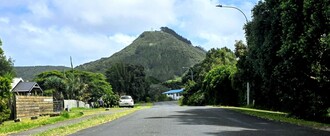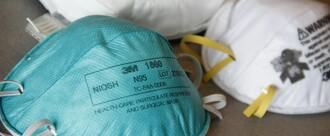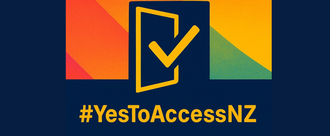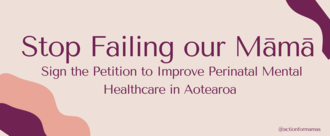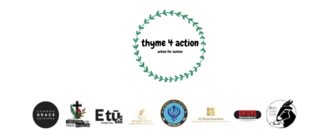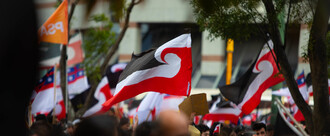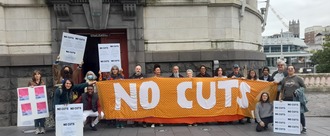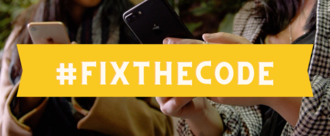-
Protect Our Community and Tamariki: Address Roaming and Dangerous Dogs in AhiparaOur Ahipara community should not have to live in fear of roaming dogs. My kids saw a dog being attacked right in front of them — it was violent, chaotic, and traumatic. No child should have to witness that, and no Council should accept it as normal. This is not about being anti-dog. It’s about keeping our community safe, ensuring people take responsibility for their pets, and preventing harm before it happens.449 of 500 SignaturesCreated by Tyrone Biddle
-
A Call for Safe Air and Masking in Healthcare SettingsWe, the general public, and the undersigned clinicians, scientists, and health professionals, call for the urgent reinstatement of basic airborne-infection-control measures—clean indoor air and appropriate airborne respiratory protection —in all healthcare settings across Aotearoa, New Zealand. These are the simplest and most effective tools to prevent avoidable illness, disability, and death among both patients and staff. Since the withdrawal of SARS-CoV-2 COVID-19 mitigations, hospitals and clinics have faced relentless outbreaks of respiratory viruses. Emergency departments are routinely operating beyond safe capacity, and senior doctors have compared recent winters to “mass-casualty situations.” [1] Aotearoa New Zealand’s “vax-and-relax” strategy has failed to protect our people. 1 in 5 children infected with COVID develop long-term symptoms. [2] Nurses and doctors have among the highest global rates of Long COVID [3], and ongoing staff illness contributes to understaffing, treatment delays, and preventable deaths. There are currently no adequate systems in place to support long COVID and post-viral disease in New Zealand, and instead, patients are met with medical gaslighting and a lack of medical and social support. [4] COVID-19 causes vascular damage and damage to every organ in the body, including the brain and heart, due to its ability to target endothelial tissues. [5] It wreaks havoc on the immune system, leading to an impaired response to future immune assaults. This has led to the rise of more severe responses to other illnesses, worsening of current conditions, outbreaks of recurrent infections (including fungal and bacterial), thus increasing pressure on emergency medical services. [6] Excuses such as "immunity debt” are not scientifically substantiated; in fact, all viruses damage rather than enhance the immune system, for example, both SARS-CoV-2 and influenza at least triple the risk of heart attacks. [7] The effects of viruses have been missed, overlooked, and minimised, leading to a culture of indifference and ignorance surrounding the impacts of catching regular viruses, including in healthcare settings and a reluctance to change following the ever-growing body of research that shows viruses can cause more significant harm than first thought. We strongly believe that every person in Aotearoa New Zealand has a right to access safe healthcare without the risk of catching a deadly or disabling virus. This falls under our legal right to health, including access to timely and appropriate healthcare. Additionally, every healthcare worker has the right to a safe workplace and working conditions that support them to stay home when sick. [8] Treating airborne infection as a matter of “personal responsibility” violates these rights and undermines public trust. Critically, for the best prevention possible, fit-tested respirator masks (N95/FFP2 and N100/FFP3) must become the standard in all health care settings. Surgical masks are proven not to be effective against aerosolised respiratory viruses. [9] According to the British Occupational Hygiene Society (BOHS), it is a breach of health and safety standards to claim that surgical masks protect against inhaled hazards. Like sterile surgical gloves or seatbelts, respirators and ventilation are proven life-saving norms —not restrictions on freedom, but tools that enable freedom through safety. We respectfully urge the Ministry of Health Manatū Hauora, Te Whatu Ora Health New Zealand and the government and other regulatory bodies in charge of these regulations to implement the following evidence-based protections: 1. Use proven mitigations to prevent the spread of respiratory and other aerosol viruses at all times. 2. The return of mandatory protections for aerosolised viruses such as SARS-CoV-2 at all times, not just during a known ward outbreak, in all clinical spaces. Including visitors, staff and patients (where medically possible). 3. Respirators, i.e N95's or equivalent, not surgical masks, are to be used as the default mask practice (this is because surgical masks are not PPE for respiratory viruses.) 4. Paid sick leave and safer staffing levels so infected staff can stay home until they are no longer infectious and are well enough to safely perform their duties. 5. Return to regular COVID testing in emergency departments and wards. Including the numbers of patients and staff catching viruses like COVID-19 in hospitals, and nationally, the number of Long Covid cases and associated pathologies. 6. Mechanical ventilation and HEPA filtration in all patient-care spaces, operated at all times rather than reactively and ensure safe CO2 levels in each space. 7. Education on the importance of masking, different types of masks, their effectiveness and the proven damaging effects of COVID-19 infections. This information needs to be shared regularly with the public. 8. Increase funding, clinical care and community support for Long Covid and associated pathologies such as ME/CFS, POTS, Cognitive issues and more. (Please read the full letter for all details and recommendations) Health is a collective responsibility. Allowing uncontrolled viral spread threatens not only individual lives but the sustainability of the entire health system. By restoring clean-air standards and airborne viral protection, Aotearoa can once again lead the world in compassionate, science-based public health. A final note to anyone in healthcare, you do not need to wait for another mandate to start masking with the best tools we have to protect yourself and patients and the community today. Thank you! From Mask Up NZ in association with Aotearoa Covid Action. This petition is dedicated to Alice Wong, Leslie Lee III, and anyone who has lost their lives or had their health impacted by viral spread in a health care setting. (contact: [email protected]) References [1] https://www.stuff.co.nz/nz-news/360816342/ [2] https://doi.org/10.1111/jpc.70104 [3] https://doi.org/10.1093/occmed/kqae113 [4] https://www.rnz.co.nz/news/national/577991/ [5] https://doi.org/10.7759/cureus.9540 [6] https://whn.global/scientific/the-long-term-immune-effects-of-covid/ [7] https://doi.org/10.1161/JAHA.125.042670 [8] https://www.legislation.govt.nz/act/public/2015/0070/latest/DLM5976660.html [9] https://www.thelancet.com/journals/ebiom/article/PIIS2352-3964(24)00192-0/fulltext1,391 of 2,000 SignaturesCreated by Mask Up NZ
-
Put Children First - Improve ECE Safety, Quality, and AccountabilityEvery family deserves to know their child is safe, nurtured, and receiving high-quality education the moment they walk through the doors of any licensed early childhood service. Yet, the Government is swinging a wrecking ball through early childhood education — slashing essential regulatory requirements and rushing through a wave of potentially harmful changes under urgency. These reforms put profit motives and the interests of service providers ahead of children and weaken the safeguards that give parents and caregivers trust and peace of mind. Let’s remind the Prime Minister, ministers of finance and education, the House of Representatives and the world that we don’t cut corners on our kids no matter what. Not here in Aotearoa. Not ever… 👉 See our full article on why this petition is necessary 👉 Follow our Facebook page for updates Sign the petition and tell the Government: • Put children first ❤️ • Stop harmful ECE reforms • Strengthen safety, quality, and accountability now!1,884 of 2,000 SignaturesCreated by ECE Parents' Council Aotearoa

-
Aotearoa's Pool Players Deserve Better: Remove NZPACue sports in Aotearoa should be games of skill, fairness, and community. When a governing body fails to protect players’ rights, ensure due process, and foster a positive culture, the whole sport suffers. Our players and these sports deserve leadership that upholds integrity, fairness, respect; leadership that wants the best for the sport and celebrates competition among players The NZPA has consistently mishandled disputes, disciplinary matters, and player relationships. Previous board members that have left due to complaints continue to have an unreasonable presence and strong influence over the NZPA. Players are subjected to unfair suspensions, bans, accusations without evidence, and inconsistent disciplinary processes. Those in positions of power have refused to recognise conflict and have behaved unethically and contrary to the rules they are obliged by. When players ask them to behave ethically and in accordance with the rules, they are targeted and removed from the association or its events. This has harmed the wellbeing of players, undermined trust, impacted the quality and progress of players and damaged the reputation of the sport nationally and internationally. Complaints include: • Suspensions and bans handed down without transparent processes or clear evidence. • Accusations of bullying, intimidation, and unfair treatment. • Lack of trust and confidence from top players and clubs. • A culture of fear, division, and exclusion rather than support and growth. • There are complaints against NZPA with the appropriate authorities Instead of protecting and promoting the sport, the current leadership has damaged its credibility. Many excellent players refuse to be part of NZPA; many venues will not host NZPA events and upcoming players are warned against them. This is destroying cue sports within and for our country. By signing, you are sending a clear message that players, clubs, and communities will no longer accept poor governance and unfair treatment. A strong public voice makes it harder for decision-makers to ignore the issues. Your support will help push for change, restore fairness, and give cue sports in Aotearoa, New Zealand the chance to thrive under leadership that players can trust. Together, we can protect the integrity of the game and the mana of those who play it. Te Karere Denied the opportunity to represent her country NZ Herald Denise Wilkinson's suspension NZ Herald Turmoil in NZ's pool community501 of 600 Signatures
-
Say YES to “Access” #YesToAccessNZ | Words shape worldsWhy this matters ““Commit to replacing ‘inclusion’ with ‘access’ on 3 December. Maybe it sticks. Maybe it doesn’t. Maybe it’s the first step toward a more equitable Aotearoa.” Access is a right, not an invite. That’s why. ” 3 December 2025 is International Day of Persons with Disabilities and is the perfect moment to flip the script, start with words, and build the access-first Aotearoa we all deserve. Words shape worlds Did you know? “Inclusion” comes from the Latin includere - in (“into”) + cludere (“to shut, close off”). To include means to be invited into something that was closed to you. You’re still outside - until someone lets you in. Access, from accessus, means “to enter or pass through without barrier.” Not by permission. By right. “Inclusion is margarine. Access is the real butter.” You’ve grown up with “inclusion” as the go-to word. It’s soft. It’s comfortable. It’s on someone else’s terms. There are gatekeepers who “let you in,” “add you in,” “invite you in.” Access is hard - but worth it. It means building places, spaces, and systems from the start—not retrofitting after the fact. It means disabled people aren’t guests. We’re already here and leading. Why Access? In a world where Access is the starting point, not the add-on: • Disabled people live lives of substance, not subsistence • Every space—physical, digital, cultural, political—is designed barrier-free, with disabled people shaping the decisions that affect us • Access is built in: to homes, schools, workplaces, marae, theatres, cities • We are Diversity, not Deficit • We are experts in our own lives, not exceptions to be managed • We inhabit time and space with equity, not as invitees to worlds not made for us • Our identities - not labels - are seen. Our ways of being are sources of insight, not problems to fix This isn’t a dream. It’s the Aotearoa we can build when Access comes first. This isn’t just about ramps and captions Access is multi-dimensional: physical, cultural, emotional, financial, spiritual, intellectual, collective, and individual. Swapping “inclusion” for “access” reframes disability not as a problem to accommodate, but as a matter of rights, design, and justice. “When we say “inclusion,” exclusion still wins. If you can be “included,” you were already excluded. Access, once embedded, cannot be denied. ” Swapping “inclusion” for “access” is more than a language fix. It's an entire mindset shift. What’s the difference? A real life example from what we know - the arts. An 8 - 10 performance season might offer: • 2 sign-language interpreted shows • 1 audio-described show • Wheelchair seating for 4 people per show That’s Inclusion - a few seats at someone else’s table. On their time, Now imagine: • Every performance is NZSL interpreted and audio described • The venue adapts seating in real time for wheelchair users That’s Access - designed with us, led by us, from the very beginning. Inclusion is soft, almost easy, and on someone else's terms, there are decision makers, gatekeepers who 'let' you in, add you in, 'invite' you in. Access is hard, but it means you actively make the effort to build the places, spaces and societies for all from the very start, not accommodate after by invite only. The ask On 3 December 2025, swap “Inclusion” for “Access” in: • Official communications • Policies • Job titles • Public events Witness what shifts. Maybe it sticks. Maybe it doesn’t. But it might just be the spark. We say yes to Access - every day. You can too - even if it’s just for one day. Just like these artists and allies here at this link: Yes to Access. This campaign is disability-led, conceived over two years by disabled artists, researchers and creators with Touch Compass, and supported by allies across Aotearoa. ✊🏽 Words shape worlds. Swap the word. Shift the world. Sign the petition. Share it! #YesToAccessNZ784 of 800 SignaturesCreated by Touch Compass Aotearoa New Zealand

-
Stop Failing our Māmā: Improve Perinatal Mental Health Services in AotearoaWith the repealing and replacing of the Mental Health Act currently taking place, now is the time to get this important issue in front of decision makers to ensure provisions are in place in the new legislation to ensure better outcomes for mothers who suffer from a perinatal mental illness. ⚠️ The Issues: • Capability of perinatal mental health services. Currently, there is a significant shortage of resources, leading to a reactive, crisis-driven approach where individuals often only receive help when they are in urgent need, much like an 'ambulance at the bottom of the cliff' response. This results in many not getting the proactive and voluntary care they require until it's too late, and thus results in compulsory treatment orders, or worst case scenario, tragic outcomes. • Lack of Specialised Care: Current mental health services are insufficiently equipped to support postpartum women, particularly in general psychiatric wards that fail to address the specific needs of mothers. • Trauma of Separation: The separation of mothers from their newborn babies during such a vulnerable time is profoundly damaging to both the mother and the child, exacerbating mental health struggles and hindering recovery. • Need for Accessible Mother and Baby Units: There is an urgent need for mother and baby units that are accessible to all women (including in the regional areas) that would allow mothers experiencing postpartum mental illness to receive the care they need while remaining with their infants, promoting healing and the vital mother-child bond. 💬 Why is this issue important to me? In 2022, after a complicated pregnancy and birth, I unfortunately developed an acute postpartum mental illness. Despite seeking help voluntarily (which included a declined referral to Maternal Mental Health whilst pregnant, requests for support while becoming unwell in hospital postpartum, and two subsequent visits to the Emergency Department where I was sent home), I was eventually sectioned under the Mental Health Act (1992), and separated from my son just three weeks postpartum. I was placed in the general psychiatric ward in Tauranga, a space that was terrifying, unsafe, and not suitable for a new mother experiencing a postpartum mental illness and recovering from childbirth. The experience left me traumatised, with symptoms of PTSD and severe depression for the first two years of my son’s life. Through my advocacy, I’ve since learned that many others have faced similar trauma due to systemic gaps in perinatal mental healthcare. The lack of specialised support has long-lasting impacts, not only on the mother and baby, but also fathers, and the wider whānau. In 2023, around the time of my son’s first birthday, I wrote to the hospital and public health services to genuinely engage about the issues I faced and suggest areas for improvement. My concerns were dismissed. This led to a decline in my mental health and forced me to step back. But in 2024, I read about the Mental Health Bill (the legislative reform of our Mental Health Act) in the Mental Health Foundation’s newsletter – and decided that this was the right time to speak out, while the issue was on the agenda for decision-makers. I made a written submission on the Mental Health Bill in December 2024, and delivered an oral submission to the Health Committee in February 2025. In May, I started an advocacy page on Instagram called @actionformamas. This is where I raise awareness and share content to help break the stigma of perinatal mental illness, including postpartum psychosis, which is a terrifying yet highly treatable perinatal mental illness that carries a lot of stigma and shame. This illness is what I experienced after the birth of my son. ✅ The Solutions • Provide proactive, compassionate, culturally appropriate, and specialist care for women who experience severe perinatal mental illness • Prevent traumatic separations, supporting recovery and bonding between māmā and pēpi • Ensure appropriate and sufficient services are in place to improve mental health outcomes for whānau across Aotearoa By improving perinatal mental health services and funding dedicated mother and baby units, we can ensure that no mother is forced to endure the traumatic separation from their newborn or face inadequate care in a general psychiatric ward. This is essential for the well-being of both mothers and their babies, and it is a necessary step in improving mental health care for all New Zealanders. ✍️ Add your name to support this change. Together, we can stop the trauma and start healing. No māmā should be left behind.1,737 of 2,000 SignaturesCreated by Kristy Maguire
-
Call for an Immediate, Permanent Ceasefire in Gaza and Ethical Action for PalestineLocal governments have a role to play in upholding this legal framework and ensuring our cities do not profit from or contribute to the normalisation of human rights violations by dealing with the listed organisations and companies. Failure to do so would be a grave blow to the credibility of and trust in the international legal order, and to the reputation of New Zealand. Palmerston North is a proud multicultural city, and a certified Welcoming Community. We have many sister cities, in support of international peace, and our Mayor is currently the President of Sister Cities NZ. Many members of our community have whakapapa to the Arab world and are deeply affected by events in the Middle East. The Palestinian members of our community are grieving; they have all lost family and friends, and have faced decades of trauma and loss. As a city, we have historically stood for peace, social responsibility, and human rights. Our Council has ethical guidelines for its operations and procurement processes, with commitments to values such as integrity, sustainability, and inclusion. It is crucial that the Council condemns injustice wherever it occurs, in reflection of our shared ethics. We cannot claim to support women while watching Palestinian women targeted and starved. We cannot say we protect tamariki while Gaza’s children are orphaned, amputated without anaesthetic, and lie cold under rubble. We cannot support human rights while turning away from genocide. This is the test of our generation, and history will remember what we choose. While Palmerston North City Council may not currently purchase large volumes of goods directly, we call for a formal policy that ensures: • PNCC does not knowingly enter into service contracts, sponsorships, or investment arrangements with companies that profit from or are complicit in violations of international humanitarian law and human rights, including the illegal occupation of Palestinian Territory. • PNCC commits to ongoing ethical screening of procurement, investment, and funding practices, in line with its existing sustainability and social responsibility goals. • PNCC aligns future policy development with New Zealand’s obligations under international law and the rulings and advisory opinions of the ICC and ICJ. This is an ethical call, not a political call. Councils have, in the past, taken ethical positions on international issues, including condemning Russia’s invasion of Ukraine, sponsoring fundraising, and fundraising for Ukraine, and refusing procurement from companies complicit in other abuses. Likewise, the procurement policies called for in this petition are neither arbitrary nor politically biased — they are based in international law: UNSC Resolution 2334, ICJ Advisory, Opinions, and the Rome Statute and Geneva Conventions, which prohibit aiding and abetting war crimes or occupation. Councils have a duty to not support or engage with entities complicit in these crimes, especially as the ICJ and ICC are now actively investigating crimes against humanity and plausible genocide. Across Aotearoa New Zealand, local authorities have begun taking action. Far North, Whanganui, Nelson, and Dunedin City Councils have passed motions calling for a ceasefire in Gaza and to uphold Palestinian human rights. In addition, Nelson and Christchurch City Councils have amended their procurement policies to comply with UNSC Resolution 2334 and not contract with the list of companies identified by the UN Human Rights Council as being involved in the building, maintenance, or consolidation of illegal Israeli settlements (as has Environment Canterbury Regional Council). Dunedin City Council’s Community Services Committee has recommended that their Council support the Unlawful Occupation of Palestine Sanctions Bill proposed by the Green Party, and supported by the Labour Party and Te Pāti Māori. This movement is part of a wider global effort. Hundreds of city councils worldwide (including in Australia, USA, Spain, Ireland, Italy, Turkey, and Belgium) have passed motions calling for a ceasefire, to divest from companies complicit in Israel’s violations of Palestinians’ human rights, and/or to end Sister City relationships. In light of the above, we urge Palmerston North City Council to pass the following motions: CEASEFIRE MOTION That Palmerston North City Council: 1. Expresses grave concern at the continuing loss of life in Gaza and Israel, and calls for an immediate and permanent ceasefire; 2. Condemns all acts of violence against civilians, and calls for the immediate release of all Israeli and Palestinian hostages held unlawfully; 3. Calls on the Government of Aotearoa New Zealand to actively support a permanent ceasefire, uphold ICJ rulings, and fulfil its legal obligations under international law, including UNSC Resolution 2334. ETHICAL PROCUREMENT MOTION That Palmerston North City Council formally adopts and enacts an ethical Procurement and Investment Framework that: 1. Incorporates respect for human rights, international law, and peacebuilding as key criteria in decision-making; 2. Screen suppliers, contractors, and investment partners for involvement in serious human rights violations, including those identified by the United Nations and international courts, UNSC Resolution 2334, and the 2004 and 2024 ICJ rulings on the wall and settlements, ensuring that Council resources are not used in ways that contribute to the occupation or related violations. Passing these motions would place Palmerston North City Council among the ethical leaders of local government in Aotearoa New Zealand, building on its commitment to sustainability and social justice.1,360 of 2,000 SignaturesCreated by thyme4action
-
PM Luxon: Uphold Codes of Conduct - Call David Seymour into lineResponsible leaders welcome advice from experts when they are creating laws and policies. They know good decision making means planning for the long term, considering diverse points of view and making evidence based decisions. This is also key to a healthy democracy. Which is why Deputy Prime Minister David Seymour’s targeting and harassment of people in academics and officials is so concerning. The Prime Minister has the responsibility to ensure the conduct of Ministers of the Cabinet is fitting of their office and inline with the Cabinet Manual. The Deputy Prime Minister’s deliberate targeting of academics and the exposure of Christchurch Council staff to ridicule by comparing them to Russian President Vladimir Putin, following their opinions on the Regulatory Standards Bill, appears to be a direct breach of the Cabinet Manual’s standards of conduct. It’s a blatant attempt to stifle academic freedom and any dissenting opinion. For the Deputy Prime Minister David Seymour to lead this online harassment campaign is concerning, as such actions could incite behaviour that spills into real-world violence. This is irresponsible and a clear breach of public trust. We expect our leaders to keep us safe, not throw us into harm’s way. Such behaviour by the Deputy Prime Minister compromises the safety and wellbeing of the targeted individuals and sets a dangerous precedent for how dissenting voices in our society are treated. It also breaches sections 2.53 and 2.56 of the Cabinet Manual. As Prime Minister and Head of the Cabinet, we urge you to immediately investigate this matter and address this serious breach of the Cabinet Manual. We expect our officials to display the highest standards of conduct and ensure that all members of our community can contribute to public debate without fear of harassment or intimidation. An official letter to this effect has already been sent to Luxon - sign this petition if you want to add your power behind the call!30,220 of 35,000 Signatures
-
Petition: Protect Public Safety and Psychology in New Zealand1. Risk to Public Safety: Psychology is a highly skilled profession requiring extensive postgraduate education, clinical training, and supervised practice. A one-year training programme following an undergraduate degree does not equip individuals with the necessary clinical competence to assess and treat individuals with mental health conditions safely and in accordance with evidence-based treatment recommendations. • Undergraduate psychology degrees in New Zealand are primarily research- and theory-focused, without substantial interpersonal or clinical skills training. • Insufficient training may lead to mismanagement of people with serious conditions such as suicide risk, psychosis, eating disorders, and personality disorders. • Associate psychologists may lack the ability to engage in essential therapeutic skills, such as validation, open-ended questioning, setting boundaries, and recognising when a case is beyond their competence. • Although there is some talk of associate psychologists seeing less complex people, it is extremely difficult to assess complexity at face value and there are indications that people in the proposed role will work across the range of complexity people face. 2. Lack of Appropriate Supervision: There is no clear reassurance that associate psychologists will be supervised by registered psychologists, despite the protected title of "psychologist." • Many psychologists in New Zealand are already stretched thin with high caseloads and complex cases, making adequate supervision difficult to guarantee. • There is no commitment that associate psychologists will work in teams with psychologists, further diminishing the structured, evidence-based, and ethically sound care that characterises our profession. • There is significant risk to the associate psychologists themselves when they work in mental health without extremely high levels of support and training. They can be taken advantage of, including financially as they may be seen as “cheaper” to hire. • If supervision is delegated to other disciplines, this raises serious ethical and professional concerns about the appropriateness and oversight of psychological interventions delivered by under qualified personnel 3. Erosion of Professional Standards and Public Trust: The introduction of associate psychologists risks confusing the public about the expertise and qualifications of those providing mental health care. • Without stringent oversight, the reputation of the psychology profession may be compromised by individuals practising beyond their competencies. • Members of the public seeking psychological services may not fully understand the difference between a psychologist and an associate psychologist, potentially receiving suboptimal care. • The title “Associate Psychologist” risks misleading the public and diminishing the professional standing of fully qualified psychologists. If the intention is to create a support role within mental health services, alternative titles such as Mental Health Support Worker, Wellbeing Practitioner, or Therapy Assistant could be used. These titles would more accurately reflect the level of training and scope of practice, without creating confusion or undermining the qualifications required to practise as a psychologist. 4. Threat to Psychology Workforce Sustainability: There has been no commitment from Health NZ that associate psychologists will not be used to replace clinical psychologists or fill vacant psychologist FTEs in the public sector. This raises concerns about cost-cutting measures that devalue the profession and create a long-term workforce crisis. • Psychologists provide evidence-based treatments that are proven to be cost-effective in the long term, reducing the burden on the healthcare system by preventing relapse, hospitalisation, and chronic mental health issues. • In contrast, associate psychologists with limited training may not have the expertise to deliver these interventions effectively, potentially leading to poorer outcomes, increased service demand, and higher overall costs. • Practising psychologists play a critical role in training and supervising the next generation of psychologists, ensuring a sustainable and competent workforce. Weakening our profession by introducing underqualified roles could undermine this vital function. • Australia recently abandoned a similar proposal following strong opposition from professional bodies, citing concerns about patient safety and the devaluation of the psychology profession[7]. New Zealand must learn from this and reconsider the implementation of a role that could have long-lasting negative consequences for mental health care in this country. The UK has two distinct roles relevant to this discussion: “Assistant Psychologist" and "Clinical Associate in Psychology" (CAPs). The role of “assistant psychologist” is not a separate scope of practice but rather a transitional role intended to provide work experience before higher levels of training. The role was never intended to provide direct, unsupervised clinical care or to serve as a substitute for registered psychologists. New Zealand risks misapplying this concept in a way that compromises the quality and safety of mental health care. Additionally, the UK requires assistant psychologists to receive at least 90 minutes of supervision per week, ensuring they do not work beyond their competencies. Their role is explicitly a stepping stone to further professional training rather than an alternative workforce solution. Clinical Associates in Psychology (CAPs) in the UK require an honours degree, an 18-month applied Master's training programme, restricted scope of practice, and intensive supervision. Notably, they do not hold the title of "psychologist." In contrast, the New Zealand proposal suggests a lower entry requirement (bachelor's degree), shorter training (12 months), broader scope, and the protected title of "psychologist." The risk of misapplying this model in New Zealand is significant, potentially compromising quality and safety in mental health care. We envision an Aotearoa that is safe and welcoming for vulnerable people, where people who need support can feel safe and contained by experienced psychologists. Unfortunately, the Government’s proposal falls significantly short of reaching that goal. By signing our petition, you are adding to a chorus of voices that tells the Government that we can do better, for all of our benefits!1,899 of 2,000 SignaturesCreated by Kumari Valentine
-
Transparent Talks for Effective Gun LawsThis issue is undeniably important to New Zealand, especially in the aftermath of the Christchurch mosque shootings. It is a matter which implicates the lives of many people including school children, vulnerable communities such as the Muslim community and the LGBTQ+ community, as well as those struggling with their mental health. By making it harder to access semi-automatic weapons, we are able to increase the safety of everyone. It is clear from observing other countries, especially the United States, that unrestricted access to semi-automatic weapons leads to violence and division. While it may not seem likely that slight changes to gun laws in Aotearoa could have a large effect, one must remember two key points: firstly, that the Christchurch shooter obtained his weapon completely legally; and secondly, that the state of mental health support in Aotearoa is abysmal. Without treating this second point, something which the current government seems to have no real intention of doing, allowing even slightly looser access to semi-automatics is a massive safety risk. It provides a space for a dangerous weapon to leave the hands of an ordinary person and fall into the hands of somebody with ill intentions. Even if there are only non-regular incidents of gun violence following these law changes, the fate of the dead and injured will be in the government’s hands. While the proposed changes are on the surface somewhat innocent - aiming to rectify the difficulty of some recreational gun users in carrying out their hobby - it carries a confusing sense of urgency and secrecy for a process which by all accounts should be taken as slowly, carefully, and yes, even bureaucratically as possible. Consultation should expand to include the opinions of the entirety of Aotearoa, not just select groups of individuals. I think it is naive to expect that these changes will only affect a small number of people. It would be unsurprising if this was only the beginning of a series of changes to gun laws in Aotearoa; Nicole Mckee, the Minister in charge of the reform, is a former gun lobbyist who may be interested in emulating the gun culture in the United States. About me I am a year 13 student from Kapiti College who is concerned about gun safety in Aotearoa. I believe in maintaining a peaceful and safe society for everyone, regardless of their background or beliefs. As a young person in Aotearoa, I want to feel confident that the government is making decisions that prioritise the safety and well-being of all communities, rather than catering to a few special interest groups. Any changes to our gun laws must be done with full transparency and public consultation. I believe that by opening up the conversation, we can come to a solution that balances the needs of recreational gun users with the safety concerns of the wider population. I urge Minister Nicole Mckee and the coalition government to release the consultation document and ensure that any changes to our gun laws are made with the input of the public, the police, and those most affected by gun violence. Together, we can build a safer Aotearoa.177 of 200 SignaturesCreated by Amaya Colombick
-
Wayne Brown: Don't Cut Community Services!NO CUTS Wayne Brown’s Budget 2023/24 is proposing to cut funding to crucial community support services during a cost of living and climate crisis. The people of Auckland are deeply concerned about the proposed budget. We understand that the Council is facing financial challenges, but we urge Auckland Council to reconsider these cuts as they will have a severe impact on the community. “Cutting regional community focused initiatives … of all groups working with Māori, Pasifika, youth, refugee, new migrant and rainbow communities.” - Page 30, Te Wāhanga Tuatoru: Te Pūtea e Marohitia Ana, Annual Budget Proposal 2022/23. We can see the budget has targeted marginalized communities, yet does not suggest cuts to industry and business whatsoever. The proposed budget cuts will have far-reaching consequences for all Aucklanders, but especially our most vulnerable residents, including children, the elderly, the working poor, and those with disabilities. Cuts to climate change, social services, community venues, public transport, arts,and education will have a devastating impact on these communities, and protesters are determined to make their voices heard. The proposed cuts to community services, including libraries, community venues and centers, youth and homelessness, early childhood education, Arts and culture, water quality and public transport, will have a negative impact on the quality of life for many Auckland residents. These services are essential for the well-being of our community and provide opportunities for social interaction, education, and access to essential resources. Furthermore, the proposed cuts to environmental initiatives, including park maintenance and waste management, will have a detrimental effect on our environment. These initiatives are critical to the sustainability of our city and the protection of our natural environment and resources. We understand that difficult decisions must be made regarding the budget, but we urge the Council to prioritize the needs of the most vulnerable. We believe that alternative solutions and a better budget is possible. The Auckland council’s feedback report suggested that the majority of Aucklanders reject this proposed budget, and it is not suited to serve Auckland residents. The sale of the airport shares is not necessary or helpful and will take Auckland backwards. The airport shares are an important revenue stream, the airport is increasing in value, and it is an asset that the Council can borrow against. The 18% shareholding is also an opportunity for public voice on the future of the airport, a strategic asset - and it is important that the Council holds onto public control in the face of climate and health emergencies. The Community Coalition against the Cuts demands that Auckland Council, Mayor and Councilors listen to Aucklanders. Consider and implement the voices of Aucklanders who took their time to give their feedback. We fully reject this proposed budget, and we demand the following: 1- NO CUTS TO REGIONAL & COMMUNITY SERVICES 2- INCREASE RATES & DEBT 3- NO SALE OF AIRPORT SHARES The super-rich must pay for this budget deficit, not the most vulnerable. We demand that any shortfall in the Council's books should be filled through increased rates on big business, and charges on luxury items such as private helicopters and super-yachts, not cuts which hit the poorest hardest. We need to be expanding services, not cutting them. We demand that the Council expands public transport, making buses and trains free and frequent, and takes more action on climate change amidst a climate crisis. We demand more funding to tackle poverty and homelessness. Therefore, we call on Auckland Council to reconsider the proposed budget cuts and to find alternative solutions that do not compromise the well-being of our community and our environment. We fully reject this budget we will not sit by quietly. We say, NO CUTS! Community Coalition Against Cuts252 of 300 SignaturesCreated by Community Coalition Against Cuts

-
Fix the CodeEveryone deserves to be kept safe online. But NZTech’s Code of Practice for Online Safety and Harms does not go far enough to protect New Zealanders from the very real dangers of online harm. The Code aims to bring together social media platforms like Meta (which includes Facebook and Instagram), Google (including YouTube), TikTok, Amazon (including Twitch) and Twitter to set an industry standard for online safety in Aotearoa. The Signatories to the Code committed to provide annual reports on their efforts toward reducing risks and harms across a number of measures - a worthy goal, in theory. However there are very real problems with the Code as it currently exists. Our main concerns are: • The Code’s self-regulation is not credible. The Code fails to ensure independent oversight of the Signatories. While an ‘Oversight Board’ is being created, membership on that board is at the sole discretion of the social media companies and there are no credible safeguards to maintain or scrutinise the Board’s independence. Those impacted by these companies are not promised a voice nor the means to use it. • The Code isn’t focused on Aotearoa. We believe that the Code’s Signatories are seeking to benefit from our international reputation to influence global regulation. The Code invokes Te Ao Māori, but the content is generic, as are the proposed governance arrangements and the consultation process. There’s no mention of the specific challenges our communities face online nor how the Signatories are working to address those challenges. The initial global reports from the Signatories were very general statements of their global policies and many of the Signatories did not even provide minimal Aotearoa-specific data. • The Signatories’ community engagement has not been effective nor credible. This is particularly embodied by the inauthentic community engagement that has been performed. While many of the people at organisations like Netsafe and NZTech have done genuine and authentic work to try to engage with civil society to make the Code effective, and we do appreciate the mahi they have performed, they have been hamstrung by the Signatories’ decisions and objectives. This means while concerns and feedback have been carried back to the Signatories, they have not been taken on board nor implemented. That’s why New Zealanders need to come together to call for better protection. And that’s why the Coalition for Better Digital Policy, led by Inclusive Aotearoa Collective Tāhono, Amnesty International Aotearoa New Zealand and Tohatoha has been formed. Many of us have been constructively critiquing the Code since it was publicly released in 2022. As a group, we aim to enable robust, inclusive, and effective regulation of technology in Aotearoa, with a focus on upholding human rights and preserving the benefits technology can provide us. Our shared experiences have convinced us that the current processes being used will not make the Code truly effective. We are calling on NZTech and the Signatories to work with us to develop a process that meets the needs of everyone at risk of harm from these companies. Add your voice by signing the petition to call on NZTech to #FixTheCode.42 of 100 SignaturesCreated by Coalition for Better Digital Policy

